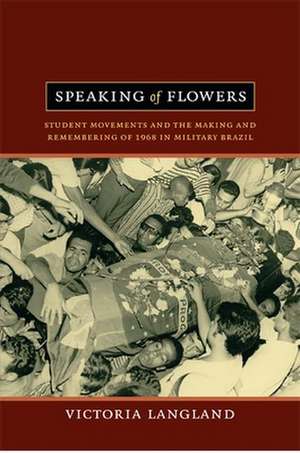Speaking of Flowers – Student Movements and the Making and Remembering of 1968 in Military Brazil
Autor Victoria Langlanden Limba Engleză Paperback – 29 mai 2013
Preț: 302.19 lei
Nou
Puncte Express: 453
Preț estimativ în valută:
57.82€ • 60.53$ • 47.85£
57.82€ • 60.53$ • 47.85£
Carte tipărită la comandă
Livrare economică 07-21 aprilie
Preluare comenzi: 021 569.72.76
Specificații
ISBN-13: 9780822353126
ISBN-10: 0822353121
Pagini: 352
Ilustrații: 32 photographs, 7 tables
Dimensiuni: 164 x 236 x 21 mm
Greutate: 0.52 kg
Ediția:New.
Editura: MD – Duke University Press
ISBN-10: 0822353121
Pagini: 352
Ilustrații: 32 photographs, 7 tables
Dimensiuni: 164 x 236 x 21 mm
Greutate: 0.52 kg
Ediția:New.
Editura: MD – Duke University Press
Recenzii
In this compelling book, Victoria Langland shows how Brazilian student activists of the 1960s generation rattled a military dictatorship, and turned into powerful symbols - martyrs and militants whose memory drove the politics of repression, opposition, and democratization. The result is striking new insight on the practical and symbolic legacies of 1968 as a year of protest and repression, in Brazil and transnationally. - Steve J. Stern,author of Reckoning with Pinochet: The Memory Question in Democratic Chile, 1989-2006"Clear, concise, and full of engaging and dramatic stories, Victoria Langland's Speaking of Flowers is an important contribution to our understanding of the history of the Brazilian student movement and its vital role in twentieth-century politics. In addition, through her analysis of the constructed memories of 1968, Langland provides readers an excellent opportunity to consider a series of methodological questions about how history is written and how Brazilians have shaped the recollection of that history." - James N. Green,author of We Cannot Remain Silent: Opposition to the Brazilian Military Dictatorship in the United States
Notă biografică
Victoria Langland is Assistant Professor of History at the University of California, Davis.
Descriere
Speaking of Flowers is an innovative study of student activism during Brazil's military dictatorship (1964-85) and an examination of the very notion of student activism, which changed dramatically in response to the student protests of 1968.









